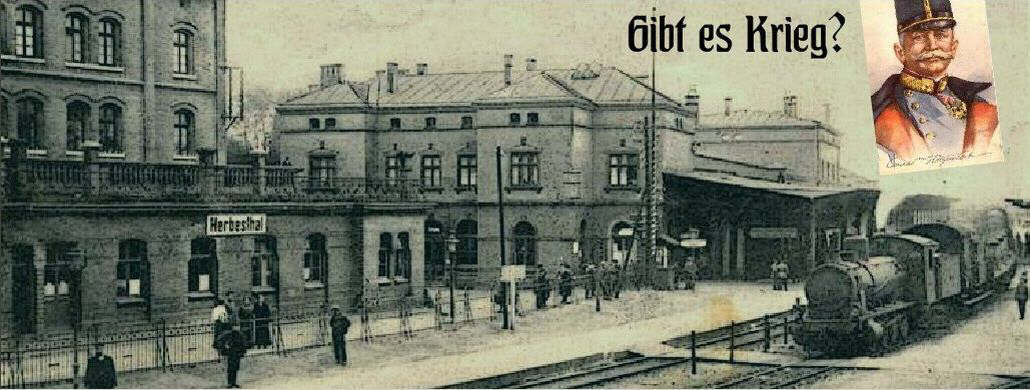
[Rhineland and Belgium, July 1914] Some newspapers spoke of war, yet a local one against Serbia that, as most people thought, was no match for the Habsburg Empire, and Serbia was far away anyway.
Serbia and Bosnia seem far away
The summer was hot an most people enjoyed it, the children were looking forward to their summer holidays. This year, Marie Bergmann would graduate from Commercial College, and all her family and friends would come together for a celebration in her honor with all her relatives and friends. Countess Sophie, Count Andras and Joscha also had come.
Sophie’s granddaughter Kathi had just persuaded her to go to the fair together. While Kathi was waiting in line by an ice-cream van, Sophie had sat down on a bench. The cheerful noise and the music was drifting over to her, but in her mind she was far away. After so many years in diplomatic service, she knew that these were crisis weeks. Count Hoyos, Chief of Cabinet of Foreign Minister Berchthold in Vienna, had travelled to Potsdam and met Kaiser Wilhelm II. The fact that the Kaiser and all the political and military leaders were on vacation did not fool her. Certainly, they already were planning troop deployment and strategies.
Diplomatic activity behind the scenes
Now Kathi came to her, and she immediately sensed that something was wrong. “You are sad, Grandmama, surely you are thinking of poor Sophie in Austria. I’m sure she was a nice lady.” “Indeed she was” Sophie replied, “Kaiser Franz Joseph should have welcomed her into his family, she deserved it so much, but all these years the court made her understand that she was not a suitable consort for the heir to the throne. Not even at the mourning ceremony was she his equal.” Kathi nodded. “Grandpa Andras and you, you also have been through a lot too before you could finally live happily together, and then Mama and Uncle Joscha were born.”
Sophie was touched, her granddaughter knew her well. Yes, Sophie and Andras had been through hard times, and now an even harder one was ahead. But she did not want to frighten Kathi with the whole truth. “You’re right about that, my darling girl,” she said affectionately, “but it’s always right to marry for love.”
While people were celebrating the summer, dancing and laughing, negotiations in Vienna and Berlin were in full swing. For years, the Austrian Chief of Staff, General Conrad von Hötzendorf had kept calling for a preventive war against Serbia. After the assassination in Sarajevo, the war party got its way. The track led to Serbia, to a radical nationalist secret organization. The war party in Vienna demanded that Serbia be “eliminated as a political power factor in the Balkans.” Kaiser Wilhelm II agreed, noting in a marginal note to a report from the German ambassador in Vienna that “the Serbs must finally be dealt with.”
A “blank check”
More than that, he gave the Austrian Emperor Franz I Joseph a “blank check”. A letter from Reich Chancellor Bethmann-Hollweg to the German envoy in Vienna, dated July 6, stated that “Emperor Franz Joseph could rely on H.M. to stand faithfully by the side of Austria-Hungary in accordance with his alliance obligations and their longtime friendship.” In Vienna, the Council of Ministers decided that “such far-reaching demands would have to be made of Serbia as would foreshadow a refusal, so that a radical solution by way of military intervention would be initiated.”
On July 23, Austria issued a 48-hour ultimatum to Serbia. In its reply note of July 25, the Serbian government addressed almost all of the demands. It assured that all guilty parties would be sought and punished, but refused to allow Austrian officials to assist in the internal Serbian investigation. Kaiser Wilhelm II praised the Serbian reply note as a diplomatic masterstroke and conceded: “This removes any reason for war.”
A last visit to Brussels
Since the fatal shots at Sarajevo, forebodings about a war and German troops marching through the neutral Belgium onto Paris had been haunting Sophie. One last time she wanted to travel to Brussels where she had living and working for so many years, to make sure all her friends and protégés were well taken care of. Moreover, she wanted to visit the graves of her beloved grandfather and her Belgian grandmother. Her husband Count Andras Csabany insisted on accompanying her. Before the children’s summer holidays and Marie’s graduation party they would be back.
So they both got on a train via Cologne, Aachen, Herbesthal on the border, they went via Leuven to Brussels. Sophie’s grandfather Hubert had been on the maiden voyage of the rail line to Belgium, she too knew the connection well; but perhaps it would be the last time in peace. Probably soldiers and war material would soon be transported on the line.
Having arrived in Brussels, they visited the house where Sophie had been living as a child, and also their home during their diplomatic days in Brussels. In order not to arouse any excitement, they stayed in a guest room of the Austro-Hungarian Embassy.
Farewell to Sophie
Tirelessly on the way in these hot July days, Sophie took on too much. She felt weak, but there so much left for her to do. Then she collapsed. Her husband was by her side at once, a doctor was fetched, but Sophie’s heart had stopped beating. She had died of a sudden heart failure.
Count Csabany was shaken. His voice broke when he told his children Lottie and Joscha about their mother’s death. A few days later they stood together at her grave in Brussels cemetery where Sophie was buried next to her grandparents. “The only thought that comforts me is that this is the death she always hoped for,” Count Andras said quietly, “quick, without any suffering, busy until her last breath.”
The ultimatum
While the mourners were silently saying goodbye at the grave, an employee of the embassy approached the Count. He had been waiting in the background for quite a while. “Count, please, I am very sorry. We have just learned that Austria-Hungary will soon hand over the ultimatum to Serbia. Many here believe that Austria and especially Germany want war. We are concerned for your safety. You should leave soon so you can get home safely.”
Together they travallled back to the Rhineland. A little later, father and son Csabany had to return to Austria. With heavy hearts, they said goodbye to Lottie, family and friends. “Won’t you come with us to Vienna after all?” asked Count Andras asked, almost against his own better knowing, “the Rhine is so close to France.” Lottie smiled through her tears. “No nearer than Vienna is to Serbia,” she answered; “take care of yourself, papa!”

Be the first to comment